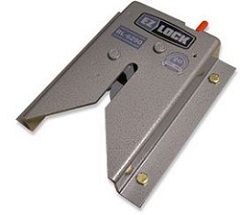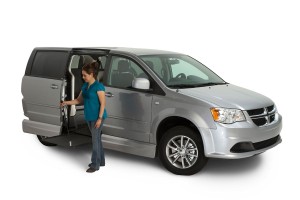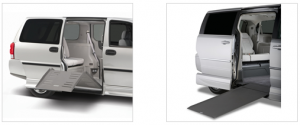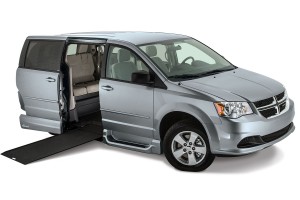
The easier it is to secure a wheelchair for transport, the more you’ll look forward to using your wheelchair van. Automatic systems are more expensive and might require buying an additional bracket when you change wheelchairs. However, customers who chose them often say that they’d never go back to any kind of manual wheelchair tie-down system.
Category Archives: Mobility
Wheelchair Van Conversion Styles: Power Wheelchair Ramps & Doors
Handicap van conversions with power wheelchair ramps and doors are the most popular because of their ease and convenience. However, manual conversions are also popular because they cost less both to purchase and to maintain. Power conversions also typically have a kneeling feature that reduces the angle or steepness of the wheelchair ramp. By compressing the suspension, the floor of the van lowers on the ramp side. We find that for most wheelchair users—especially those in manual wheelchairs—this angle reduction is very helpful, if not critical.

Dodge Grand Caravan With the VMI Northstar E Manual In floor Ramp
Wheelchair Van Conversion Styles: In-Floor Ramp Vs. Fold-out Ramp
There are several wheelchair accessible van conversion styles you’ll want to consider when choosing the right mobility solution for you. One decision you’ll have to make is to choose between an In-Floor wheelchair van ramp and a Fold-Out wheelchair accessible ramp.
In-Floor Vs. Fold-Up Wheelchair Ramps
Another important consideration to make is whether you’d prefer a fold-up or an in-floor wheelchair ramp in your handicap van. As their name implies, fold-up ramps fold in half and stow upright, next to the side passenger door. On the other hand, in-floor ramps slide into a pocket underneath the vehicle’s floor. People who opt for in-floor ramps prefer the ramp out of the way of the passenger entrance. Typically, fold-up ramps tend to be less expensive and easier to maintain, and they present a lower ramp angle. In-floor and fold-up wheelchair ramps are available in a wide range of handicap minivan conversions.

Wheelchair Van Conversion Styles: Side-Entry Vs. Rear-Entry
There are several wheelchair accessible van conversion styles you’ll want to consider when choosing the right mobility solution for you. One decision you’ll have to make is to choose between a side-entry wheelchair van and a rear-entry wheelchair accessible van.
Side-Entry Vs. Rear-Entry Wheelchair Vans
One of the most important choices you’ll make in selecting a handicap accessible wheelchair van is side entry versus rear entry. Your choice will impact such things as the wheelchair seating positions, your ability to accommodate other passengers, and parking options. Side-entry wheelchair vans represent the majority of the market—over 75% for most personal use vehicles. However, rear-entry wheelchair vans are also gaining in popularity as more products become available. Here is a look at some key points you’ll want to be aware of.
| Style | Side-entry wheelchair minivans | Rear-entry wheelchair minivans |
|---|---|---|
| Advantages |
|
|
| Important options |
|
|
| Limitations |
|
|
| Conversion price | $19,000-$25,000* *Cost of conversion only (vehicle cost is additional). |
$17,000-$22,000* *Cost of conversion only (vehicle cost is additional). |
Q&A’s About the 100% Disabled Veteran’s Homestead Exemption
If you qualify as a 100% Disabled Veteran, you will be interested in the answers to the most commonly asked questions below.
- What are the qualifications for this exemption?
- You qualify for this 100% homestead exemption if you meet these requirements:
- You own a home and occupy it as your residence homestead.
- You are receiving 100% disability compensation from the US Department of Veterans Affairs for a service-connected disability.
- You have a disability rating of 100% disabled or of individual unemployability.
To get this exemption, you must fill out Form 11.13, checking the box for 100% Disabled Veterans Exemption, as well as all boxes that apply to you. You must attach documentation as well. You may attach a copy of your award letter, a “VA tax letter,” or another document from the United States Department of Veterans Affairs showing 100% disability compensation due to a service-connected disability and a rating of 100% disability or of individual unemployability. The documents you attach must be current documents.
- You qualify for this 100% homestead exemption if you meet these requirements:
- How much of my home’s value will it exempt?
- If you qualify, your home will be totally exempt from property taxes in all jurisdictions, regardless of the home’s value. If you co-own the home with someone other than your spouse, your share of the home’s value will be exempted.
- I already have a homestead exemption. Do I need to apply for the 100% Disabled Veteran Homestead Exemption?
- Yes. This exemption is not given automatically.
- I just qualified for the disabled veteran’s exemption. Why do I need to send you my documentation for this exemption?
- Qualifications for the 100% Disabled Veteran Homestead Exemption differ from those for the prior disabled veteran’s exemption. In particular, you must show that you actually receive 100% disability compensation for a service-connected disability, and have a rating of 100% disability or individual unemployability.
- When is the new homestead exemption effective?
- If you apply and qualify for the current tax year as well as the prior tax year, you will be granted the 100% Disabled Veteran Homestead Exemption for both years. Effective January 1, 2012, you may receive this exemption for the applicable portion of the year immediately upon qualification. (This applies to 2012 forward; not to prior years).
- I bought my home after January 1, 2011. Will I get the new exemption for part of 2011?
- No. The exemption will take effect for the 2012 year if you didn’t own your home on January 1, 2011.
- My disability rating is actually 50%, but because I am over 65, I receive the maximum disability exemption. Do I qualify for the new homestead exemption?
- No. You must be 100% disabled or have a rating of individual unemployability to qualify for the 100% Disabled Veteran Homestead Exemption. You must also be receiving 100% disability compensation from the VA. If the VA reduces or changes either of these ratings, it is your responsibility to notify the appraisal district in writing.
- If something happens to me, will the new homestead exemption pass to my spouse or children?
- Your surviving spouse, married to you and living at the same residence, may qualify to continue this exemption.
- I owe delinquent taxes on my home for years before 2011. Will the new exemption affect those?
- No. The exemption will apply for 2011 forward. It does not affect prior years.
- I am in a hospital or nursing home. Can I still get the new exemption?
- Yes, as long as you intend to return to the home when you are able.
- My spouse and I own our home together. How is this homestead exemption calculated?
- If the home is community property, it is calculated as if you owned 100% of the home. If the home is not community property, the exemption is prorated in proportion to the value of your interest.
- I have a mortgage on the home. Can I still get the new homestead exemption?
- Yes.
- I don’t currently have a homestead exemption. Do I need to apply for the regular homestead exemption in addition to this one?
- You should also apply for the regular homestead exemption. This will ensure that you receive the maximum benefits of the regular exemption should your qualification for the new exemption change.
- I have recently turned 65. Should I apply for the over-65 homestead exemption in addition to the new exemption?
- Yes, for the same reasons given above.
- Q. How much of my home’s value will the new exemption exempt?
- Your home will be totally exempt from property taxes.
- I meet all of the qualifications for this exemption. I currently apply the $12,000 regular disabled veteran’s exemption to my home. When I get the 100% Disabled Veteran Homestead Exemption, what happens to the other exemption?
- This exemption will exempt all of the value of your home. Consequently, the $12,000 disabled veteran’s exemption will have no effect. If you own other taxable property (such as a vacation home or business), you should file a new application with the appraisal district and designate the $12,000 exemption as applying to the other property.
- Will I have to reapply every year for the 100% Disabled Veteran Homestead Exemption?
- No. Once your exemption is granted, you will not have to reapply unless the chief appraiser requires you to do so in writing.
- I already have a disability homestead exemption on my home. What is the difference between that one and this one?
- The existing disability homestead exemption has different requirements and benefits. For that exemption, you must meet the Social Security Administration’s definition of disabled, which is not necessarily the same as that used by the VA or your branch of the military. The benefits are also different. Only school districts are required to provide a disability homestead exemption, though many other taxing entities do. The 100% Disabled Veteran Homestead Exemption will apply to all taxing units and will exempt the total value of your home.
- Can I apply this exemption to my main home and get the general homestead exemption on my vacation home?
- No. Both exemptions apply only to the home that is your principal residence. You can, however, apply the prior disabled veteran’s exemption to your vacation home.
- How do I get documentation of my status from the VA?
- You can contact the VA at 1-800-827-1000. Their website is at www.va.gov.

